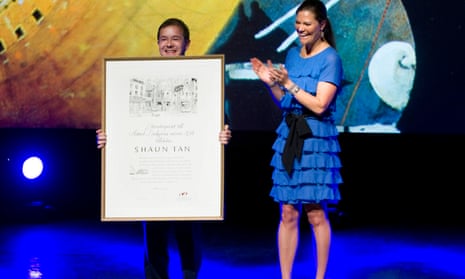UK authors are leading the charge for the world’s richest children’s literature prize, the Astrid Lindgren memorial award, with 20 British writers and illustrators among this year’s 237 nominations. Next is Sweden with 13, followed by Australia with 12 and the US with 11.
The prize, which is worth SEK 5m (£400,000), was founded by the Swedish government to honour the memory of Pippi Longstocking’s creator. It goes to a children’s author, illustrator, oral storyteller or reading promoter from anywhere in the world, whom a jury of experts deem to be “working in the spirit” of Astrid Lindgren.
The writer and translator Daniel Hahn, one of the UK’s nominees, said the strong showing from British authors reflects the vigour in children’s books publishing in the UK. “We produce a lot of good work,” he said, “but also, significantly, we export a lot of it.”
The fact that there are almost twice as many contenders from the UK as there are from the US may be to do with the way the nominations are sourced, he added, but the prize puts British writers and illustrators “in an international context”.
“Yes, there might be 20 of us,” Hahn said, “but there are also over 200 people on this list from other countries, most of whom are usually comprehensively ignored over here.” Creators such as Allan Ahlberg, David Almond, Quentin Blake, and Shirley Hughes appear alongside writers of a similar stature from all over the world, he said. who are entirely unknown in the UK. “I’d challenge even a real children’s books expert in the UK to recognise a quarter of the names on this list. It’s a reminder of the extraordinary range of what’s out there, but also, I’m afraid, of our own extraordinary insularity.”
Former winners include Philip Pullman, cited for writing that “stands firmly on the side of young people, ruthlessly questioning authority and proclaiming humanism and the power of love whilst maintaining an optimistic belief in the child even in the darkest of situations”, and US author Jacqueline Woodson, who the jury said “introduces us to resilient young people fighting to find a place where their lives can take root”.
Candidates are nominated by organisations from all over the world, with 2019’s UK contenders also including Frances Hardinge, Theresa Breslin, Patrick Ness, Jan Pienkowski and Katherine Rundell.
The winner of the prize will be announced in March next year. This year’s laureate, Belgian author Bart Moeyaert, said the award was “like a huge hug”; judges had praised his body of work for “portray[ing] relationships at crisis point with a cinematic immediacy, even as his complex narratives suggest new ways forward”.
“Literature broadens your mind and opens frontiers,” Moeyart said. “Literature gives you a language to express yourself and say what you mean. Literature can make you feel angry, and that’s important, because it forces you to think.”
